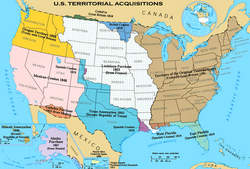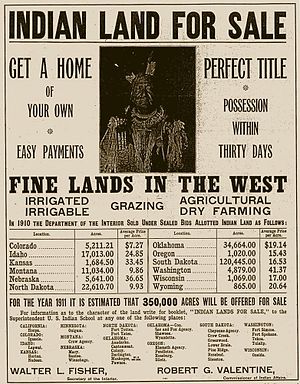Settler Colonialism
Settler colonialism occurs when colonizers invade and occupy territory to permanently replace the existing society with the society of the colonizers.

Settler colonialism is a form of exogenous domination typically organized or supported by an imperial authority, which maintains a connection or control to the territory through the settler's colonialism. Settler colonialism contrasts with exploitation colonialism, which entails an economic policy of conquering territory to exploit its population as cheap or free labor and its natural resources as raw material. In this way, settler colonialism lasts indefinitely, except in the rare event of complete evacuation or settler decolonization.
Settler colonialism was especially prominent in the colonial empires of the European powers between the 16th and 20th centuries. The settling of Boers in South Africa, British, French, Portuguese and Spanish expansion in the Americas as well as the settlement of the Canary Islands by Castile are classical examples of settler colonialism.
Origins as a theory
During the 1960s, settlement and colonization were perceived as separate phenomena from colonialism. Settlement endeavors were seen as taking place in empty areas, downplaying the Indigenous inhabitants. Later on in the 1970s and 1980s, settler colonialism was seen as bringing high living standards in contrast to the failed political systems associated with classical colonialism. Beginning in the mid-1990s, the field of settler colonial studies was established distinct but connected to Indigenous studies. Although often credited with originating the field, Australian historian Patrick Wolfe stated that "I didn’t invent Settler Colonial Studies. Natives have been experts in the field for centuries." Additionally, Wolfe's work was preceded by others that have been influential in the field, such as Fayez Sayegh's Zionist Colonialism in Palestine and Settler Capitalism by Donald Denoon.
Definition and concept
Settler colonialism occurs when foreign settlers arrive in an already inhabited territory to permanently inhabit it and found a new society. Intrinsically connected to this is the displacement or elimination of existing residents and destruction of their society.
Some scholars describe the process as inherently genocidal, considering settler colonialism to entail the elimination of existing peoples and cultures, and not only their displacement (see genocide, "the intentional destruction of a people in whole or in part").
Depending on the definition, it may be enacted by a variety of means, including mass killing of the previous inhabitants, removal of the previous inhabitants and/or cultural assimilation.
Settler colonialism is distinct from migration because immigrants aim to join an existing society, not replace it.
Examples

Settler colonial studies has often focused on former British colonies in North America, Australia and New Zealand, which are close to the complete, prototypical form of settler colonialism. However, settler colonialism is not linked to any specific culture and has been practiced by non-Europeans. The settler colonial paradigm has been applied to a wide variety of conflicts around the world, including the New Caledonia, Western New Guinea, the Andaman Islands, Argentina, Australia, British Kenya, the Canary Islands, Fiji, French Algeria, Generalplan Ost, Hawaii, Hokkaido, Ireland, Israel/Palestine, Italian Libya and East Africa, Kashmir, Korea and Manchukuo, Latin America, Liberia, New Zealand, northern Afghanistan, North America, Posen and West Prussia and German South West Africa, Rhodesia, Sápmi, South Africa, South Vietnam, and Taiwan.
Africa

Canary Islands
During the fifteenth century, the Kingdom of Castile sponsored expeditions by conquistadors to subjugate under Castilian rule the Macaronesian archipelago of the Canary Islands, located off the coast of Morocco and inhabited by the Indigenous Guanche people. Beginning with the start of the conquest of the island of Lanzarote on 1 May 1402 and ending with the surrender of the last Guanche resistance on Tenerife on 29 September 1496 to the now-unified Spanish crown, the archipelago was subject to a settler colonial process involving systematic enslavement, mass murder, and deportation of the Guanches, who were replaced with Spanish settlers, in a process foreshadowing the Iberian colonisation of the Americas that followed shortly thereafter. Also like in the Americas, Spanish colonialists in the Canaries quickly turned to the importation of slaves from mainland Africa as a source of labour due to the decimation of the already small Guanche population by a combination of war, disease, and brutal forced labour. Historian Mohamed Adhikari has labelled the conquest of the Canary Islands as the first overseas European settler colonial genocide.
Morocco
As part of the Western Sahara conflict, the Kingdom of Morocco has sponsored settlement schemes that have enticed thousands of Moroccan citizens to relocate to the Moroccan-occupied Western Sahara. This regulated migration has been in effect since the Green March in 1975, and it was estimated in 2015 that Moroccan settlers accounted for two-thirds of the 500,000 inhabitants of Western Sahara.
Under international law, the transfer of Moroccan citizens into the occupied territory constitutes a direct violation of Article 49 of the Fourth Geneva Convention (cf. Turkish settlers in Northern Cyprus and Israeli settlers in the Palestinian territories).South Africa

In 1652, the arrival of Europeans sparked the beginning of settler colonialism in South Africa. The Dutch East India Company was set up at the Cape, and imported large numbers of slaves from Africa and Asia during the mid-seventeenth century. The Dutch East India Company established a refreshment station for ships sailing between Europe and the east. The initial plan by Dutch East India Company officer Jan van Riebeeck was to maintain a small community around the new fort, but the community continued to spread and settle further than originally planned. There was a historic struggle to achieve the intended British sovereignty that was achieved in other parts of the Commonwealth. State sovereignty belonged to the Union of South Africa (1910–61), followed by the Republic of South Africa (1961–1994) and finally the modern day Republic of South Africa (1994–Present day).
In 1948, the policy of Apartheid was introduced South Africa in order to segregate the native African population from Boer settlers and ensure the domination of the White populace over non-whites, politically, socially and economically. As of 2014, the South African government has re-opened the period for land claims under the Restitution of Land Rights Amendment Act.
Americas


In colonial America, colonial powers created economic dependency and imbalance of trade, incorporating Indigenous nations into spheres of influence and controlling them indirectly with the use of Christian missionaries and alcohol. With the emergence of an independent United States, desire for land and the perceived threat of permanent Indigenous political and spatial structures led to violent relocation of many Indigenous tribes to the American West, in what is known as the Trail of Tears.
In response to American encroachment on native land in the Great Lakes region, the Pan-Indian confederacies of the Northwest Confederacy and Tecumseh's Confederacy emerged. Despite initial victories in both cases, such as St. Clair's defeat or the siege of Detroit, both eventually lost, thereby paving the way for American control over the region. Settlement into conquered land was rapid. Following the 1795 Treaty of Greenville, American settlers poured into southern Ohio, such that by 1810 it had a population of 230,760. The defeat of the confederacies in the Great Lakes paved the way for large land loss in the region, via treaties such as the Treaty of Saginaw which saw the loss of more than 4,000,000 acres of land.
Frederick Jackson Turner, the father of the "frontier thesis" of American history, noted in 1901: "Our colonial system did not start with Spanish War; the U.S. had had a colonial history from the beginning...hidden under the phraseology of 'interstate migration' and territorial organization'". While the United States government and local state governments directly aided this dispossession through the use of military forces, ultimately this came about through agitation by settler society in order to gain access to Indigenous land. Especially in the US South, such land acquisition built plantation society and expanded the practice of slavery. Settler colonialism participated in the formation of US cultures and lasted past the conquest, removal, or extermination of Indigenous people. In 1928, Adolf Hitler spoke admiringly of the impact of white settler colonialism on the Natives, stating the US had "gunned down the millions of Redskins to a few hundred thousand, and now keep the modest remnant under observation in a cage". The practice of writing the Indigenous out of history perpetrated a forgetting of the full dimensions and significance of colonialism at both the national and local levels.
Eurasia
China

Near the end of their rule the Qing tried to colonize Xinjiang, Tibet, and other parts of the imperial frontier. To accomplish this goal they began a policy of settler colonialism by which Han Chinese were resettled on the frontier. This policy was renewed by the People's Republic of China, led by Chinese Communist Party.
Palestine, Zionism and Israel

In 1967, the French historian Maxime Rodinson wrote an article later translated and published in English as Israel: A Colonial Settler-State? Lorenzo Veracini describes Israel as a colonial state and writes that Jewish settlers could expel the British in 1948 only because they had their own colonial relationships inside and outside Israel's new borders. Veracini believes the possibility of an Israeli disengagement is always latent and this relationship could be severed, through an "accommodation of a Palestinian Israeli autonomy within the institutions of the Israeli state". Other commentators, such as Daiva Stasiulis, Nira Yuval-Davis, and Joseph Massad in the "Post Colonial Colony: time, space and bodies in Palestine/Israel in the persistence of the Palestinian Question" have included Israel in their global analysis of settler societies. Ilan Pappé describes Zionism and Israel in similar terms. Scholar Amal Jamal, from Tel Aviv University, has stated, "Israel was created by a settler-colonial movement of Jewish immigrants".
Writing in the 1990s, the Australian historian Patrick Wolfe is credited with originating the field. He theorized settler colonialism as a structure (rather than an event) premised on the elimination rather than exploitation of the native population, thus distinguishing it from classical colonialism. Wolfe argued that settler colonialism was centered on the control of land, that it continued after the closing of the frontier, and that continued to exist today, classifying Israel as a modern form of settler colonialism. His approach was defining for the field, but has been challenged by other scholars on the basis that many situations involve a combination of elimination and exploitation.
Moses Lissak asserted that the settler-colonial thesis denies the idea that Zionism is the modern national movement of the Jewish people, seeking to reestablish a Jewish political entity in their historical territory. Zionism, Lissak argues, was both a national movement and a settlement movement at the same time, so it was not, by definition, a colonial settlement movement.
Russia and the Soviet Union

Some scholars describe Russia as a settler colonial state, particularly in its expansion into Siberia and the Russian Far East, during which it displaced and resettled Indigenous peoples, while practicing settler colonialism. The annexation of Siberia and the Far East to Russia was resisted by the Indigenous peoples, while the Cossacks often committed atrocities against them. During the Cold War, new forms of Indigenous repression were practiced.
This colonization continued even during the Soviet Union in the 20th century. The Soviet policy also sometimes included the deportation of the native population, as in the case of the Crimean Tatars.[unreliable source?]
Taiwan
According to a PhD thesis by Lin-chin Tsai, the ethnic makeup of Taiwan's contemporary population is largely the result of Chinese settler colonialism beginning in the seventeenth century.
Australia

Europeans explored and settled Australia, displacing Aboriginal and Torres Strait Islander peoples. The Indigenous Australian population was estimated at about 795,000 at the time of European settlement. The population declined steeply for 150 years following settlement from 1788, due to casualties from infectious disease, the Australian frontier wars and forced re-settlement and cultural disintegration.
Responses
Settler colonialism exists in tension with indigenous studies. Some indigenous scholars believe that settler colonialism as a methodology can lead to overlooking indigenous responses to colonialism; however, other practitioners of indigenous studies believe that settler colonialism has important insights that are applicable to their work. Settler colonialism as a theory has also been criticized from the standpoint of postcolonial theory.
Political theorist Mahmoud Mamdani suggested that settlers could never succeed in their effort to become native, and therefore the only way to end settler colonialism was to erase the political significance of the settler–native dichotomy.
According to Chickasaw scholar Jodi Byrd, in contrast to settler, the term arrivant refers to enslaved Africans transported against their will, and to refugees forced into the Americas due to the effects of imperialism.
In his book Empire of the People: Settler Colonialism and the Foundations of Modern Democratic Thought, political scientist Adam Dahl states that while it has often been recognized that "American democratic thought and identity arose out of the distinct pattern by which English settlers colonized the new world", histories are missing the "constitutive role of colonial dispossession in shaping democratic values and ideals".
See also
References
Further reading
- Adhikari, Mohamed (2021). Civilian-Driven Violence and the Genocide of Indigenous Peoples in Settler Societies. Routledge. ISBN 978-1-000-41177-5.
- Cox, Alicia. "Settler Colonialism". Oxford Bibliographies. OUP. Retrieved 21 January 2021.
- Dahl, Adam (2018). Empire of the People: Settler Colonialism and the Foundations of Modern Democratic Thought. University Press of Kansas. ISBN 978-0-7006-2607-6.
- Englert, Sai (2022). Settler Colonialism: An Introduction. Pluto Press. ISBN 978-0-7453-4490-4.
- Belich, James (2009). Replenishing the earth : the settler revolution and the rise of the Anglo-world, 1783–1939. Oxford: Oxford University Press. p. 573. ISBN 978-0-19-929727-6.
- Horne, Gerald. The Apocalypse of Settler Colonialism: The Roots of Slavery, White Supremacy, and Capitalism in Seventeenth-Century North America and the Caribbean. Monthly Review Press, 2018. 243p. ISBN 9781583676639
- Horne, Gerald. The Dawning of the Apocalypse: The Roots of Slavery, White Supremacy, Settler Colonialism, and Capitalism in the Long Sixteenth Century. Monthly Review Press, 2020. ISBN 978-1-58367-875-6.
- Manjapra, Kris (2020). "Settlement". Colonialism in Global Perspective. Cambridge University Press. pp. 43–70. ISBN 978-1-108-42526-1.
- Marx, Christoph (2017). Settler Colonies, EGO - European History Online, Mainz: Institute of European History, retrieved: March 17, 2021 (pdf).
- Mikdashi, Maya (2013). What is settler colonialism? American Indian Culture and Research Journal 37.2: 23–34.
- Schuessler, Jennifer. "What Is ‘Settler Colonialism’?" New York Times Jan 22, 2024.
- Settler Colonialism in the Twentieth Century (edited by Susan Pedersen and Caroline Elkins), Routledge, 2005.
- Veracini, Lorenzo (2010). Settler Colonialism: A Theoretical Overview. Hampshire, UK: Palgrave MacMillan. p. 182. ISBN 9780230284906.
- Wolfe, Patrick, 'Traces of History: Elementary Structures of Race' (Verso 2016)
- Wolfe, Patrick (December 2006). "Settler colonialism and the elimination of the native". Journal of Genocide Research. 8 (4): 387–409. doi:10.1080/14623520601056240. S2CID 143873621.
External links
This article uses material from the Wikipedia English article Settler colonialism, which is released under the Creative Commons Attribution-ShareAlike 3.0 license ("CC BY-SA 3.0"); additional terms may apply (view authors). Content is available under CC BY-SA 4.0 unless otherwise noted. Images, videos and audio are available under their respective licenses.
®Wikipedia is a registered trademark of the Wiki Foundation, Inc. Wiki English (DUHOCTRUNGQUOC.VN) is an independent company and has no affiliation with Wiki Foundation.